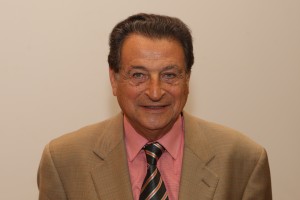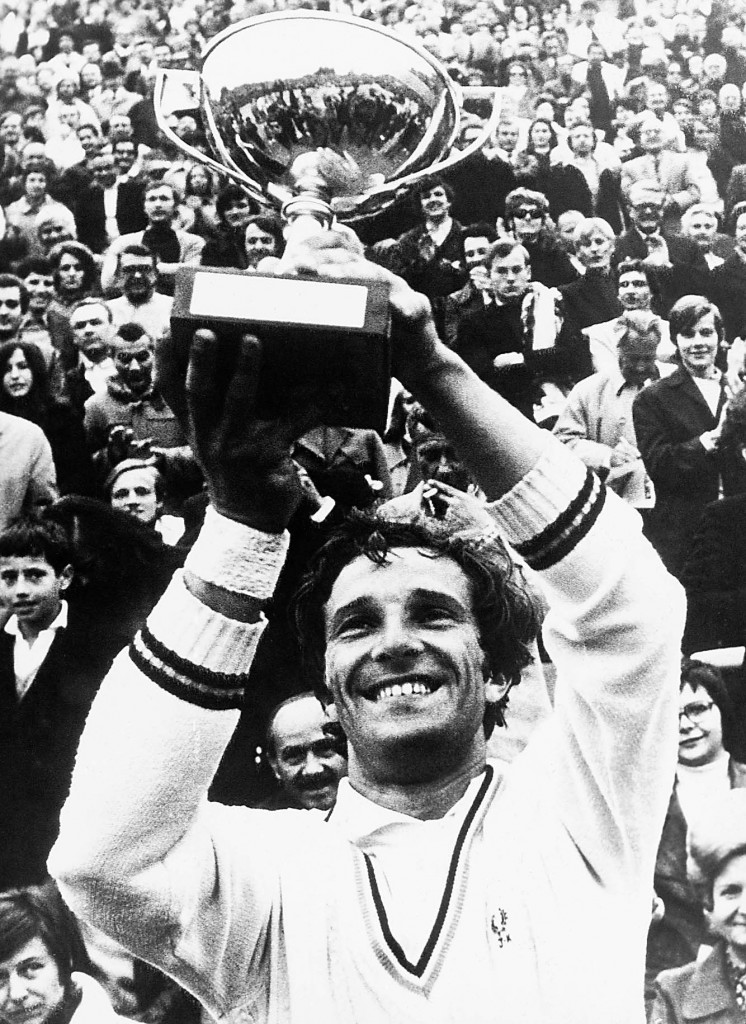As the tennis world is focused on the French Championships at Roland Garros, it is worth giving attention to a great French figure in the world of tennis, Pierre Darmon. Not only was Pierre an accomplished player, but one of the leading administrators who helped the sport immensely in the early days of Open Tennis. Sandra Harwitt profiled Darmon in her book “The Greatest Jewish Tennis Players of All Time,” a guide to the best and most influential Jewish tennis players in the history of the sport. The following is an excerpt from the book (available here http://www.amazon.com/dp/193755936X/ref=cm_sw_r_tw_dp_iEgYub1G0P727 via Amazon.com) that profiles Darmon.
When Pierre Darmon made an appointment to meet me for a chat, he suggested we rendezvous in front of the Tenniseum, the Normandy-styled cottage on the grounds of Roland Garros that houses a fabulous museum dedicated to the history of French tennis. It seemed a natural choice of locale and not just because he helped in organizing the Tenniseum or because during the French Open the Tenniseum houses the tournament’s Final Eight Club where anyone who reached the singles quarterfinals or doubles semifinals can enjoy tournament hospitality. This Tenniseum venue was actually where Darmon had his office back when he was the tournament director of Roland Garros.
Before we went to enjoy a cup of coffee and talk about his life and times in tennis in the comfort of the Final Eight Club, Darmon wanted to show me something special in the Tenniseum. There, behind a glass wall on display, was a trophy cup. Darmon painted the picture of the importance of the cup with his words, telling how fellow Frenchman Benny Berthet, a jeweler before World War II, fashioned that cup out of tin cans. Berthet, who was born in New York but a Frenchman, became a prisoner of war during World War II and, along with other prisoners, built a tennis court where they were incarcerated. Berthet organized a tournament and designed the trophy, which was rather impressive looking.
“He was Jewish, too, and I was very, very close to him,” said Darmon, of his friend, who served as France’s Davis Cup captain from 1955 through 1965 and for whom the annual pre-Roland Garros charity day was named for many years. “His story, it’s really a fantastic story.”
Darmon, a French Open singles finalist and Wimbledon doubles finalist in 1963, was born on January 14, 1934 in Tunis, Tunisia. At age 17, he traveled to live on his own in Paris and France became his home. Initially, he was thinking he would attend the Sorbonne for university and pursue tennis, but doing both was difficult and he chose tennis over studying. Still a Tunisian citizen, his decision to give up his studies led to some consequences — he was obligated to serve in the Tunisian army for two-and-a-half years. “At that time, we were involved in the Algerian War, so when I stopped my studies I had to go to the army. Since I was the No. 1 Tunisian player at that time as such there was a place where sports people had a facility so during the season — the summer — we could play tennis and during the winter we had to go and serve in Algeria.”
Being Jewish was just a fact of life for Darmon, who is not particularly religious, and said his religious affiliation had no bearing whatsoever on his career: “I don’t think that was any significance at all. I never felt all through my years in tennis that there was any significance to whether I was or was not Jewish.” One year he was planning on playing the Maccabiah Games but instead he had to go to Algeria to take part in the war.
For Darmon, playing on the French Davis Cup team was a particular favorite memory. He competed in 34 Davis Cup ties from his first appearance in the international team competition in 1956. He had an impressive 44-17 singles record, but won only three of seven doubles matches. He holds the record for most wins and most singles victories for a French Davis Cup player and is second – by one tie – behind Francois Jauffret for most Davis Cup ties played.
As impressive as Darmon’s tennis career was, it was when he became involved in the business aspect of tennis that he truly had a major impact in the sport. Retired from tennis in 1968, Darmon dedicated himself to seeing tennis through the growing pains of going from an amateur game to an international professional sport.
“I got involved in the French association,” Darmon said. “I was picked to run Roland Garros, being like the general manager, which back then was a facility only open during the summer. When I got in there, they only had two contracts — Slazenger balls was on the leaderboard because they gave the balls to play with for free and there were four Coca-Cola signs and that contract was per year and just $1,000. That was what I found.
“It was 1973 when I was also the (French Open) tournament director and I was the one negotiating for bringing sponsors. I was the one who had negotiations to bring BNP Paribas in as a sponsor. But, in fact, I was indirectly dealing with them. The one who really made the deal for BNP was Benny Berthet.”
Darmon’s position as tournament director at Roland Garros was initially a volunteer position, after five years when he was provided some income for the position, he admitted it was basically a “symbolic” gesture.
One of his favorite accomplishments was borrowing the idea of exclusively located box seats that he saw during a Davis Cup rubber in Rome. He brought a similar concept to Roland Garros, having prime boxes installed on the stadium court: “I am proud about that because today these boxes are sold for $80,000 Euros, each box. And this is a lot of revenue. And they’re in the best position to see a match.”
When the ATP started as the men’s union in 1973, Darmon was asked to be a founding board member. “I created, with Jack Kramer, the first ATP office in Europe. And you see how life is that Benny Berthet had a big building on the Champs Elysee that he was the owner of and he gave us a little space where we could start a little ATP office in Europe.” Eventually, in 1980, Darmon became the Vice President for ATP: Europe, which by then was headquartered in Monte Carlo.
When he moved on from his Roland Garros position with the French Federation of Tennis, Darmon took a position with ProServ, an American management company, as their European Director from 1979 through 1990. He returned to the ATP Europe office as the Chief Executive from 1990 through 1996.
“You cannot compare something so different as the playing and the business and politics,” said Darmon, who finally quit playing tennis at age 77 in 2011. “I really must say I enjoyed every moment of my playing and then working and still am enjoying. I cannot complain.”
Darmon married Mexican player Rosie Reyes, a Roland Garros doubles champion, more than 50 years ago, and they have three children and four grandchildren. He was inducted into the International Jewish Sports Hall of Fame in 1977. And in November 2002, the ITF honored Darmon with their Davis Cup Award of Excellence.


